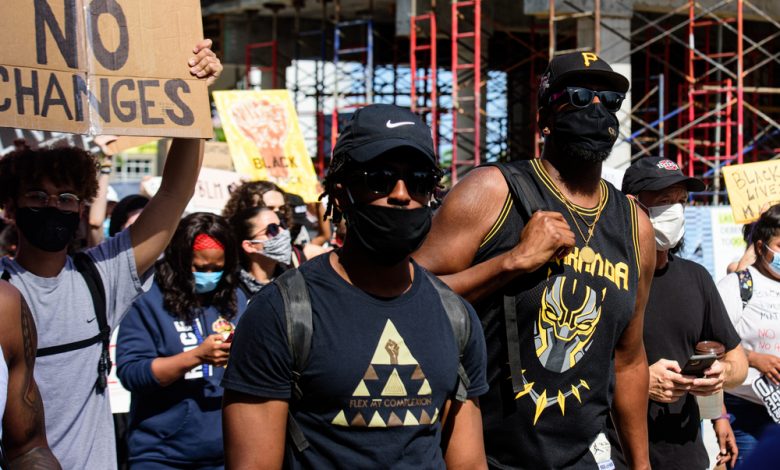
Every other item in the news is about how blacks are oppressed by white people who are guilty of systemic racism. This towering falsehood is utilized by criminal groups like Black Lives Matter to excuse looting, arson, and murder. It is perpetuated by race baiters such as Jesse Jackson, Al Sharpton, and Oprah Winfrey in order to encourage white guilt and to inflame the black love affair with victimization. This narrative is completely upside down. Rather than exhibiting systemic racism, white Americans have bent over backwards to make life better for blacks. History bears this out. By giving their lives to end slavery, enabling the Civil Rights Movement, instituting affirmative action, and voting for a black president, white America has shown itself to be anything but racist. Based on the historical record, the demand for a blanket apology from whites cannot be justified.
The apology we deserve is from the group of blacks who have poisoned America with massive crime, violence, chronic anger and hostility, self-victimization, anti-white racism, anti-Semitism, and unwillingness to accept American values of hard work, family, and taking personal responsibility. Unfortunately, there are some blacks that expect to achieve the American Dream without having to earn it most of the rest of us. Instead, they insult us by calling our achievements "white privilege." If we continue to reward substandard behavior by blacks, America — and all the good things we associate with it — will go up in flames. It is time to receive appreciation from blacks for living in the least racist nation on earth. Remember what Muhammad Ali said: "Thank God my granddaddy got on that boat."
The systemic racism argument is used by race baiters to avoid a truthful discussion of the damage done to our country by antisocial behavior. When whites talk about blacks, they do so with kid gloves, apologetically, carefully so as to avoid giving offense. It has become impossible to say anything critical of blacks without somebody calling you a racist. Are we really a racist nation? There is not one white person in my acquaintance who harbors a racist attitude towards blacks. Yet every white person I know has admitted to me privately that his personal experience with black behavior has been overwhelmingly negative. My friends have been on the receiving end of anti-white racism in the form of verbal and physical assaults. When blacks moved in, their neighborhoods deteriorated into a downward spiral of crime, squalor, and decay. You can’t fault people for paying attention to their experience. It is not racism. It is a response to behaviors, not to skin color. Even Jesse Jackson once said, “There is nothing more painful to me than to walk down the street and hear footsteps and start thinking about robbery, then look around and see somebody white and feel relieved.”
My family lived in a mixed-race neighborhood in Brooklyn, New York. Over a ten-year period, the area became almost exclusively black. In what has been given the pejorative term, “white flight,” most of the white families moved to other city neighborhoods or to the suburbs. My family stayed put. As more blacks moved in, we had to live with constant stress from exploding black crime and anti-white assaults. Thanks to black violence, my experience of walking down the street was closer to Beirut than Brooklyn. When you have been mugged and cursed and knocked down because your skin color is white, you are less sympathetic to the “systemic racism” argument.
The idea that people with white skin are inherently flawed is absurd on its face. The value system that has made the US successful as a nation is an achievement of white people. Whites founded our republic. Whites gave their lives to end slavery. Whites created a society, a work in progress, that is able to correct itself in response to changing times. Like it or not, white people drive the engine that makes this country work. In contrast, young people in the black subculture hold themselves back by deliberately rejecting white values — the rule of law, education, the work ethic, meritocracy, taking personal responsibility. This self-destructive behavior — not white racism or white privilege — is ruining the lives of millions of black kids.
The assumption of Black Lives Matter is that blacks can claim a monopoly as objects of bigotry. Try telling that to Hispanics, Jews, Irish, Italians, Asians and other groups that have been on the receiving end of discrimination and intolerance. Watch movies like “Gentlemen’s Agreement” and “Gangs of New York” if you want to understand that racism is not aimed solely at blacks. In fact, blacks are considered by many to be more racist than any other group. A Rasmussen poll reported that 37 percent of American adults think most black Americans are racist, while only 15 percent say the same about whites. “More whites have begun talking about themselves as a racially oppressed majority,” reports CNN. “In a widely publicized 2011 survey, white Americans said they suffer from racial discrimination more than blacks.”
Individual instances of racism are occurring and always will occur — against blacks and whites — but to suggest that racism against blacks is institutionalized is to deny the colossal changes that have occurred since the Civil Rights Movement of the 1960s. It was a big deal in 1947 when Jackie Robinson broke the color line in professional sports. Today, 70 percent of NBA players are black. We elected a black president TWICE. African-Americans are accorded special privilege — "black privilege” — in every nook and cranny of our country.
"The oppression of black Americans is over with," acknowledged respected black author Shelby Steele. When people say that America is plagued by “systemic racism,” says Steele, “what they're really doing is expanding the territory of 'entitlement.’ The truth of the matter is, blacks have never been less oppressed than they are today. Opportunity is around every corner… If you are black and you want to be a poet, or a doctor, or a corporate executive, or a movie star, there will surely be barriers to overcome, but white racism will be among the least of them,” says Steele. “You will be far more likely to receive racial preferences than to suffer racial discrimination.”
“White institutional racism has disappeared from our society,” agrees Scott Greer in No Campus for White Men. “Black Americans now have every opportunity that white Americans have long enjoyed.” It is not white privilege that prevents blacks from doing better, says author David Horowitz, it is black behavior — the propensity to commit violent crimes, the inability to build intact families, and the unwillingness to accept personal responsibility. Black women do not take responsibility for having children out of wedlock and black fathers do not take responsibility for supporting their children.
The term “systemic racism” has “no meaning,” says black economist Thomas Sowell. "You hear this phrase, 'systemic racism,' 'systemic oppression.' You hear it on our college campuses. You hear it from very wealthy and fabulously famous sports stars... What does that mean?” Sowell asks. “And whatever it means, is it true? It really has no meaning that can be specified and tested in the way that one tests hypotheses. It does remind me of the propaganda tactics of Joseph Goebbels during the age of the Nazis, in which he's supposed to have said that 'People will believe any lie if it is repeated long enough and loud enough.' It's one of many words that I don't think even the people who use it have any clear idea what they're saying. Their purpose served is to have other people cave in."
Former civil rights activist Bob Woodson issued a sweeping indictment of the idea that "systemic racism" is the cause of black hardship in the US. "I don't know what systemic racism is. Maybe someone can explain what that means," Woodson said on Tucker Carlson Tonight. “After 50 years of liberal Democrats running the inner cities, where we have all of these inequities, race is being used as a ruse, as a means of deflecting attention away from critical questions such as, ‘Why are poor blacks failing in systems run by their own people?’”
To be truthful about the causes of social disruption in the US, we must point a finger not at white America but rather at the black community. In spite of a continuing history of violence, blacks are not being held responsible for their behavior. Black men make up six percent of the US population. In 2015, according to Heather Mac Donald in The War on Cops, blacks were charged with 62 percent of all robberies, 57 percent of murders, and 45 percent of assaults in the 75 largest US counties. Blacks in New York City committed 75 percent of all shootings, 70 percent of robberies, and 66 percent of all violent crime. Ignoring the obvious connection between black criminality and black incarceration, the Left continues to blame the police. In 2020, it is ridiculous to suggest — as does Black Lives Matter — that white police are gunning for blacks. Actually, more unarmed whites are shot by police than blacks. The bulk of responsibility, said former New York Mayor Rudy Giuliani, is on blacks who “commit murder eight times more per capita than any other group in our society.” “The fault lies primarily with the black criminals,” says political commentator Dennis Prager, “not with a racist society.” Black talk show host Larry Elder agrees. “Numerical disparities result from differences of offending,” he said, “not because of racism.”
The vast majority of racially motivated crimes are committed by blacks against whites. The prevalence of black-on-white crime, spectacularly ignored by the media, has been chronicled by Colin Flaherty in Don’t Make the Black Kids Angry: The Hoax of Black Victimization and Those Who Enable It. “A new generation of black leaders and white enablers want to remove black violence from the table,” Flaherty says, “and instead focus on the Big Lie: the war on black people and how racist white people are waging it. That is the biggest lie of our generation. Because just the opposite is true. Black crime and violence against whites, gays, women, seniors, young people and lots of others is astronomically out of proportion.” Heather Mac Donald, writing in City Journal, agrees. “Whites are the overwhelming target of interracial violence,” she says. “Between 2012 and 2015, blacks committed 85.5 percent of all black-white interracial violent victimizations. That works out to 540,360 felonious assaults on whites.” Black-on-black crime is even worse, as proven by the daily murder statistics emanating from cities like Chicago, Baltimore, and New York.
Political commentator Bill O’Reilly believes that the white privilege argument encourages blacks not to take personal responsibility. When you realize that this negative value is already a cancer in black America, blaming white people only compounds an existing problem. Wall Street Journal editorial board member Jason Riley, who is black, has accused civil rights leaders of being more interested in “blaming the problems of blacks on white racism” than getting to the real causes. Blacks lag behind other groups in economic success, safe neighborhoods, and family cohesiveness. The question is, who or what is responsible? Heather Mac Donald contends that blacks must be held responsible for their own negative behaviors. The notion that blacks are victims of a racist society may have been true prior to the 1960s, she says, but this is a half century after the Civil Rights Movement.
Encouraging blacks not to take responsibility for their own lives is part of the Democratic Party’s plan to make blacks dependent on government handouts. The black family, claims the Heritage Foundation, was destroyed by “the progressive term ‘compassion’ during the War on Poverty, which began in 1964.” The number of African-American lives damaged or destroyed by Democratic Party welfare policies, says David Horowitz, “would exceed the wildest dreams of any klansman.” The legacy of the Left’s welfare system is the break-up of low-income black families, the explosion of out-of-wedlock births, systemic poverty, higher black crime statistics and rates of incarceration, and the substantial decrease of black households headed by someone who works.
The primary fallacy of the Left’s redistribution plan is that it does nothing to end the pattern of black poverty. The current system of welfare entitlements benefits no one other than the charter members of the Victimization Industry, people like Jackson and Sharpton. Entitlements foster a victim mentality that places the blame on whites. “Victimhood has become a mental plague on black America,” says black activist Candace Owens. The rationale for the welfare state is the perception that low-income blacks can’t make it on their own. “The problem is that Washington is building a culture of dependency,” reports CNN, “with ever more people relying on an ever-growing federal government to give them cash or benefits.” No group has been impacted by this more than blacks. Under this culture of dependency, black welfare recipients lose the work habits and job skills that would otherwise make them independent.
By providing a steady stream of income to unwed black mothers, the welfare system has eliminated fathers because payments are tied to their absence. The Heritage Foundation has called out black men for “the largest-scale abandonment of women by men in human history.” Poverty is being transferred from generation to generation with no hope in sight. “You cannot take any people, of any color,” said Thomas Sowell, “and exempt them from the requirements of civilization — including work, behavioral standards, personal responsibility and all the other basic things that the clever intelligentsia disdain — without ruinous consequences to them and to society at large.”
The George Floyd incident has been an excuse for the destruction of our cities and the repudiation of American values in order to make restitution for outdated black grievances. A history of slavery, while abhorrent, does not give blacks the right to demand better treatment than anyone else. “Past oppression cannot be conflated into present-day oppression,” says Shelby Steele. “It is likely that today’s racial disparities are due more to dysfunctions within the black community.”
Steele put his finger on the problem. The black community has unfortunately become increasingly dysfunctional. In education and the professions, blacks have at times precipitated a lowering of standards that threatens America’s competitiveness on the world stage. A continuing tradition of black violence in urban settings is bringing the civil society to its knees. Blaming it on white oppression only heightens racial tensions. It’s time for blacks to step up to the plate. Difficult as it may be to swallow, facing the truth can’t be such a bad idea.





Leave a Reply
Thank you for your response.
Please verify that you are not a robot.